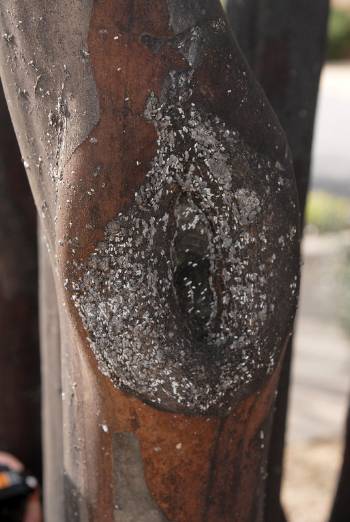Crapemyrtle Bark Scale
Nashville, Ark. – Now is a great time to check the health of your Crapemyrtles. Most gardeners will be alerted to a problem when they see there is a sooty mold substance on the trees. This is due to what is known as CMBS (Crapemyrtle Bark Scale). Crapemytle Bark Scale is easy to identify and treat as long as it is caught in a timely manner. If left undetected or untreated, the CMBS will spread rapidly. A heavy infestation will result in white crusted clusters of insects which may blanket small stems and be quite visible on the trunks. If you get up close or use a magnifying glass, you will see that the adult is white to gray in color and there may be dozens of pink eggs or crawlers under some of the larger white scale covers. It is suspected that there may be at least two generations in Arkansas.
Now the question is, once CMBS has been found, what can be done in order to treat the tree? CMBS will not kill your tree, so there is no need to remove them. However, treatment is necessary. The scale will NOT kill your trees, but they reduce the amount and size of the blooms and the sooty mold makes them less attractive. Systemic insecticides work very well to control the bark scale, but the timing is most effective when applied in late winter/early spring.
If you are just now spotting the problem, you can clean off the trunk with warm, soapy water to remove the black sooty mold.
Once all the leaves have fallen, saturate the tree with a dormant oil. This should kill many of the crawlers and adults but won’t kill them all. Then treat with a systemic insecticide in late March through early May with a product containing Imidacloprid (Merit® or Bayer Advanced™ Tree and Shrub Insect Control), thiomethoxam (Meridian® ) and dinotefuran (Greenlight Tree and Shrub Insect Control with Safari). These products will be taken up by the tree and moved throughout the system of the tree and have shown good results in controlling the scale.
In order to keep it from spreading, there is some maintain that will have to be done. If you have small limbs which are heavily infested, prune them off and dispose of them. Do not put them in a compost pile or put them out on the curb for yard-waste pick-up. In a perfect world, burning the debris would be the best way to eradicate the pest, but unfortunately, we can’t burn refuse in the city.
Left exposed in an open truck or put on the curb for yard waste pickup leads to a possibility that the millions of tiny crawlers could be easily spread to neighboring properties, thus accelerating the spread of this invasive insect. Instead, double bag the cuttings and put them in your regular trash pickup.
Be aware, once the insects die, they will still be on the plant, but no longer causing damage and not spreading. There is no need to do preventative treatment, so only treat a tree that has the insect problem - but do monitor all the crape myrtles in your yard. The sooner you can catch the problem, the easier and quicker the problem can be solved.
For more information, you can send an email to skroll@uada.edu. Howard County Extension office is still working and is there for all the residences in Howard County during this time.
By Samantha Kroll
County Extension Agent - Agriculture
The Cooperative Extension Service
U of A System Division of Agriculture
Media Contact: Samantha Kroll
County Extension Agent - Agriculture
U of A Division of Agriculture
Cooperative Extension Service
421 N. Main Nashville AR 71852
(870) 845-7517
skroll@uada.edu
Related Links
The Arkansas Cooperative Extension Service is an equal opportunity institution. If
you require a reasonable accommodation to participate or need materials in another
format, please contact your County Extension office (or other appropriate office)
as soon as possible. Dial 711 for Arkansas Relay.
Pursuant to 7 CFR § 15.3, the University of Arkansas System Division of Agriculture
offers all its Extension and Research programs and services (including employment)
without regard to race, color, sex, national origin, religion, age, disability, marital
or veteran status, genetic information, sexual preference, pregnancy or any other
legally protected status, and is an equal opportunity institution.
